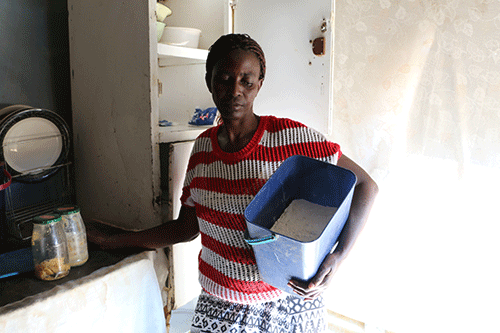Two Khomas regional councillors who represent a vast number of poor people who live on the outskirts of Windhoek, have expressed frustration over the increasing number of residents flocking to their offices in search of food, particularly women with small babies.
In the past six months, two constituencies in Windhoek have recorded over 1 800 people approaching councillors for food.
The worried councillors are Stefanus Ndengu and Nestor Kalola.
The Samora Machel constituency office alone registered over 1 500 individuals during this period, while the Moses
/Garoeb constituency recorded over 300. In a heartfelt gesture, the latter councillor decided to divert his entertainment budget to provide food for the needy instead of using it for its intended purpose.
According to the 2022 Global Hunger Index, Namibia suffers from a serious level of hunger, ranking it 78th out of 116 countries. Malnutrition is a growing concern, with 24% of children under the age of five stunted (reduced growth relative to age), 6% experiencing wasting (weighing too little for their height) and 13% underweight.
To alleviate hunger, government earlier this year decided to transition the Food Bank programme to a conditional basic income grant. A cash transfer of N$600 per household will be made monthly for 8 339 Food Bank beneficiaries.
The councillors state that the situation is particularly dire, as many of these people, especially those with small babies, would have gone days without food if their neighbours did not share their meals. These individuals are not beneficiaries of social grants, and are not registered for government’s Food Bank programme.
Ndengu, the Moses ||Garoëb constituency councillor, assumed office in February after winning 2 970 votes in the by-election. He has now taken it upon himself to share his entertainment allowance with the hungry to ameliorate the situation.
“When I first took office, I compiled a list of close to 300 people. Initially, I reached out to various organisations for assistance, and we managed to secure food for 282 individuals from 27 locations in the constituency”, he said. Additionally, the office attempted to secure long-term support, receiving two 50kg bags of maize meal per month to sustain approximately 60 people.
However, the situation is more challenging for councillor Kalola in Samora Machel, as the number of people seeking assistance is much higher than the available resources.
He, too, uses his salary and allowances to feed the people, but the demand surpasses the available supply.
New Era managed to speak to some of the women on the list from Samora Machel, who recently visited the councillor’s office in search of food. Among them is Ludwig Fillemon, a 30-year-old mother of twins, residing in the Havana informal settlement.
“I don’t have food. We went to the councillor’s office looking for food, but he was not there. I only have a 1kg pack of instant porridge at home, which I rely on to breastfeed my babies”, she said emotionally. Fillemon added that she often goes weeks without eating solid food, and surviving on tea to produce enough breastmilk for her babies. She thus appealed for assistance from kind-hearted individuals to provide food for her children.
Another woman facing similar difficulties is Priscilla Kandovazu, who was accommodating over 30 people in her home in the Goreangab informal settlement.
She sought a meal for herself and her school-going children at the councillor’s office.
Kandovazu said: “I had about 32 people in my shack, but most of the family members recently left for the farm after I failed to secure food from the councillor’s office. Now, there are only 10 of us, and we are in dire need of food.”
Although she used to receive assistance from a church, it is insufficient for their large household. She mentioned a kind-hearted individual from Wanaheda who provides her with a one-day-a-month cleaning job so that she can buy a 10kg bag of maize meal.
Saima Angula, a 47-year-old mother of five, likewise approached the councillor’s office last week for food. She has been going hungry for months, and expressed concern for her two-year-old daughter, who needs solid food.
The woman is unemployed, and unable to feed her child. She relies on her neighbour, who gave her 2kg of mahangu flour to make porridge for her daughter.
Angula came to Windhoek in 2018 to work as a domestic worker, but her employer terminated her contract, stating that her child had grown and her services were no longer required.
Lusis Vati, a 32-year-old with a three-year-old baby suffering from heart problems, also faces a dire situation.
She requires proper nutrition for her medication to be effective, but is currently unemployed and unable to provide for her child. She also appealed for help.
Tufudzwa Paul Kurichengera is experiencing extreme hardship. He lacks even a blanket or a proper bed, and often relies on neighbours to rescue him from his excruciating situation.
Proposed Solutions
The two elected representatives suggest that the Office of the Prime Minister (OPM), responsible for rural drought distribution, extends the programme to urban areas.
Kalola stated: “I believe the only solution here is for the OPM to consider visiting the informal settlements, and assess these situations. People are hungry, and our resources are depleted as we are forced to spend our own money to feed them.”
He also proposed revising the Food Bank list to remove those who had secured jobs, and to add new individuals. Kalola emphasised the need to address the vulnerability of these people, and expressed concern about the worrisome situation.
Ndengu suggested that vulnerable individuals in informal settlements – who are not registered for social grants and the Food Bank – be included in the drought relief programme, as the situation is really getting out of hand.
He underlined the similarities between the living conditions in these areas and those in rural villages, highlighting the lack of basic amenities such as toilets, water and electricity in some locations.



